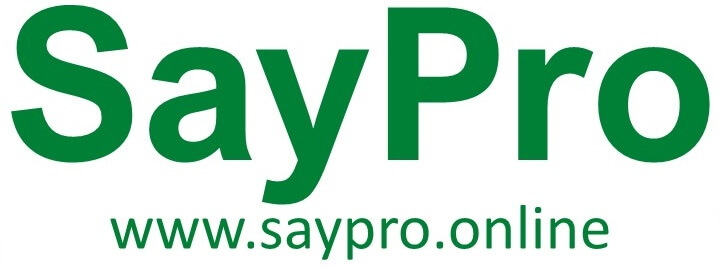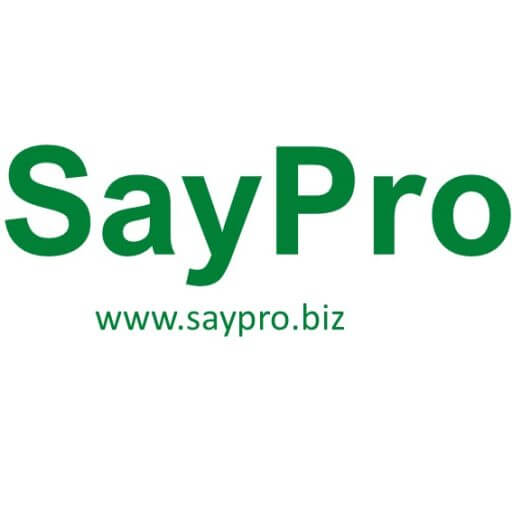Your basket is currently empty!
- SayPro
- Shop
- About Us
- SayPro Company History
- SayPro Corporate Governance
- SayPro Leadership Team
- SayPro Board of Directors
- **SayPro Executive Committee
- SayPro Chief Executive Officer (CEO)
- SayPro Chief Operations Officer (COO)
- SayPro Chief Financial Officer (CFO)
- SayPro Chief Human Resource Officer (CHR)
- SayPro Chief Research Officer (CRO)
- SayPro Chief Strategic Partnerships Officer (SPO)
- SayPro Chief Marketing Officer (CMO)
- SayPro Chief Legal Offier (CLO)
- SayPro Chief Clients Officer (CCO)
- SayPro Chief Technology Officer (CTO)
- SayPro Chief Training Officer (CTO)
- **SayPro Board Committees
- SayPro Investors Relations
- Services
- SayPro Agricultural Forestry Fisheries Environment and Ocean Industry
- **SayPro Banking Finance Treasury Bookkeeping Insurance and Accounting Industry
- **SayPro Children Women Youth and Persons with Disabilities Industry
- SayPro Communications Digital Technology Creative Writing Video and Automation Industry
- SayPro Consulting Project Management Audit Advisory Planning Monitoring Evaluation Learning Industry
- SayPro Board ESG Corporate Governance International Relations and Cooperation Industry
- **SayPro Transport Culture Arts Heritage Tourism Hospitality and Sport Industry
- **SayPro Defence Safety Justice Policing Investigation and Security Industry
- **SayPro Food and Beverage Manufacturing Fibre Processing Industry
- *SayPro Food and Beverage Manufacturing Services
- **SayPro Product Development and Innovation Services
- **SayPro Food Processing and Manufacturing Services
- SayPro Supply Chain Management Services
- **SayPro Quality Assurance and Testing Services
- **SayPro Packaging and Labelling Services
- SayPro Distribution and Logistics Services
- **SayPro Marketing and Branding Services
- *SayPro Fibre Processing Services
- *SayPro Food and Beverage Manufacturing Services
- **SayPro Health Welfare Migration Social Development and Sustainable Livelihood Industry
- Events
- Research
- **SayPro Market Research Service
- **SayPro Consumer Research Service
- **SayPro Social Research Service
- **SayPro Policy Research Service
- **SayPro Research Services
- **SayPro Financial Research Service
- **SayPro Technical Research Service
- **SayPro Health Research Services
- **SayPro Consumer Research Service
- **SayPro Educational Research Service
- Courses
- Partner
- **Introduction To SayPro Corporate Partnership
- **Overview Of SayPro’s Mission, Values, And Areas of Focus
- **Available SayPro Partnership Opportunities
- **Why Partner with SayPro Corporate?
- **How To Become a SayPro Corporate Partner
- **SayPro Corporate Partner Expectations and Commitments
- **Recognition And Benefits for SayPro Corporate Partners
- **SayPro Partnership Frequently Asked Questions (FAQs)
- **Contact Information
- Investors
- **SayPro Investors Home
- **About SayPro Investors
- **SayPro Investors Investment Opportunities
- SayPro Personal Investors
- SayPro Angel Investors
- SayPro Venture Capitalists Investors
- SayPro P2P Lending Investors
- SayPro Banks Investors
- SayPro Financial Investors
- SayPro Friends and Family Investors
- SayPro Institutional Investors
- SayPro Passive Investors
- SayPro Business Incubators Investors
- SayPro Development Finance Institutions Investors
- SayPro Family Offices Investors
- **Why Invest in SayPro:
- **SayPro Investor Resources
- **SayPro Investors Relations
- **SayPro Investors News and Updates:
- **SayPro Investors Events:
- **Contact SayPro Investors:
- SayPro
- Shop
- About Us
- SayPro Company History
- SayPro Corporate Governance
- SayPro Leadership Team
- SayPro Board of Directors
- **SayPro Executive Committee
- SayPro Chief Executive Officer (CEO)
- SayPro Chief Operations Officer (COO)
- SayPro Chief Financial Officer (CFO)
- SayPro Chief Human Resource Officer (CHR)
- SayPro Chief Research Officer (CRO)
- SayPro Chief Strategic Partnerships Officer (SPO)
- SayPro Chief Marketing Officer (CMO)
- SayPro Chief Legal Offier (CLO)
- SayPro Chief Clients Officer (CCO)
- SayPro Chief Technology Officer (CTO)
- SayPro Chief Training Officer (CTO)
- **SayPro Board Committees
- SayPro Investors Relations
- Services
- SayPro Agricultural Forestry Fisheries Environment and Ocean Industry
- **SayPro Banking Finance Treasury Bookkeeping Insurance and Accounting Industry
- **SayPro Children Women Youth and Persons with Disabilities Industry
- SayPro Communications Digital Technology Creative Writing Video and Automation Industry
- SayPro Consulting Project Management Audit Advisory Planning Monitoring Evaluation Learning Industry
- SayPro Board ESG Corporate Governance International Relations and Cooperation Industry
- **SayPro Transport Culture Arts Heritage Tourism Hospitality and Sport Industry
- **SayPro Defence Safety Justice Policing Investigation and Security Industry
- **SayPro Food and Beverage Manufacturing Fibre Processing Industry
- *SayPro Food and Beverage Manufacturing Services
- **SayPro Product Development and Innovation Services
- **SayPro Food Processing and Manufacturing Services
- SayPro Supply Chain Management Services
- **SayPro Quality Assurance and Testing Services
- **SayPro Packaging and Labelling Services
- SayPro Distribution and Logistics Services
- **SayPro Marketing and Branding Services
- *SayPro Fibre Processing Services
- *SayPro Food and Beverage Manufacturing Services
- **SayPro Health Welfare Migration Social Development and Sustainable Livelihood Industry
- Events
- Research
- **SayPro Market Research Service
- **SayPro Consumer Research Service
- **SayPro Social Research Service
- **SayPro Policy Research Service
- **SayPro Research Services
- **SayPro Financial Research Service
- **SayPro Technical Research Service
- **SayPro Health Research Services
- **SayPro Consumer Research Service
- **SayPro Educational Research Service
- Courses
- Partner
- **Introduction To SayPro Corporate Partnership
- **Overview Of SayPro’s Mission, Values, And Areas of Focus
- **Available SayPro Partnership Opportunities
- **Why Partner with SayPro Corporate?
- **How To Become a SayPro Corporate Partner
- **SayPro Corporate Partner Expectations and Commitments
- **Recognition And Benefits for SayPro Corporate Partners
- **SayPro Partnership Frequently Asked Questions (FAQs)
- **Contact Information
- Investors
- **SayPro Investors Home
- **About SayPro Investors
- **SayPro Investors Investment Opportunities
- SayPro Personal Investors
- SayPro Angel Investors
- SayPro Venture Capitalists Investors
- SayPro P2P Lending Investors
- SayPro Banks Investors
- SayPro Financial Investors
- SayPro Friends and Family Investors
- SayPro Institutional Investors
- SayPro Passive Investors
- SayPro Business Incubators Investors
- SayPro Development Finance Institutions Investors
- SayPro Family Offices Investors
- **Why Invest in SayPro:
- **SayPro Investor Resources
- **SayPro Investors Relations
- **SayPro Investors News and Updates:
- **SayPro Investors Events:
- **Contact SayPro Investors:
Click Here: [Contact SayPro] [Recruit] [Agri] [Login] [Courses] [Training Material] [Jobs] [ListBusiness/NPO/Govt] [Services] [Shop] [Volunteer] [Internships] [Learnerships] [Donate] [Give] [Sell] [Camps] [Events&Catering] [Research] [Laboratory] [Career Guidance] [Machines] [Apply] [Partner] [Corporate Training] [Sponsor] [Study] [Sell Courses] [About SayPro] [Advertise] [Influencers] [Publish] [Write ] [Invest ] [Franchise] [Staff] [CharityNPO] [Freelancers] [School] [Clinic/Hospital] [Competitions] [Travel]


